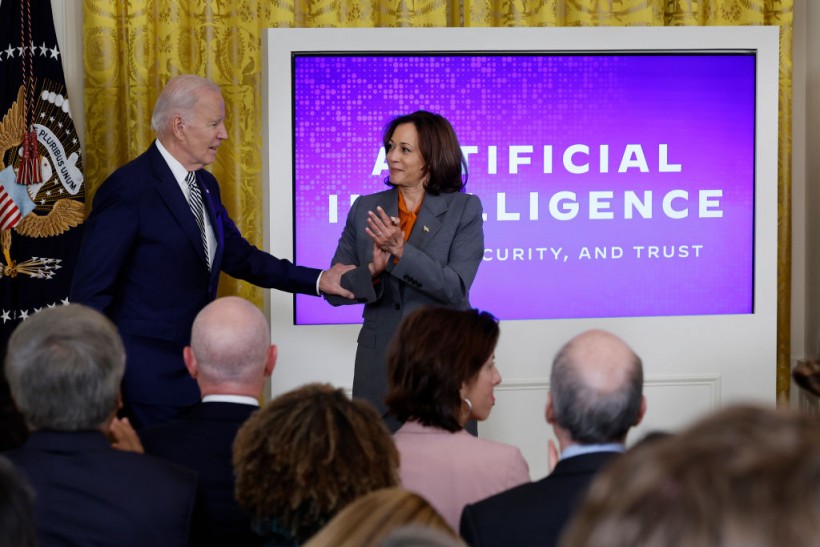A new analysis by the Voting Rights Lab, a nonpartisan voting rights watchdog, reveals that AI's rapid development has caused numerous states to introduce guardrails against it, all to be prepared for the upcoming AI-riddled elections.
The Voting Rights Lab stated that it was monitoring over 100 bills in 39 state legislatures that had measures aimed at regulating the potential for AI to generate election misinformation.
The legislature comes amid several high-profile incidents of "deep-fake" video technology, computer-generated avatars, and voices being utilized in political campaigns and commercials.

(Photo: Chip Somodevilla/Getty Images) President Joe Biden and Vice President Kamala Harris hold an event to highlight their administration's approach to artificial intelligence in the East Room of the White House on October 30, 2023, in Washington, DC.
According to the New York Times, several pieces of AI-related legislation stand out. For the first time this year, Wisconsin will require political marketers to declare the use of artificial intelligence-generated material or risk financial penalties.
According to a measure signed into law on Thursday by Democrat Gov. Tony Evers, political marketers would risk a $1,000 punishment for each infraction.
A similar legislation passed both chambers of the Florida legislature and is now being reviewed by Republican Gov. Ron DeSantis. A spokesperson for Mr. DeSantis stated that he had yet to see the law's final text, which includes both civil and criminal sanctions.
Arizona's State Senate and House have enacted their respective versions of measures prohibiting the use of deep fakes or generated pictures. Each chamber's legislation has yet to be taken up by the other chamber. One version would criminalize deepfakes within 90 days of an election. Repeated infractions would constitute a crime.
Read Also: Google Releases AI Safeguards Ahead US, Global Elections
California's AI Law Aspirations
The California Initiative for Technology and Democracy, on the other hand, aims to learn from and collaborate with Europe in developing the state's artificial intelligence laws.
Legislators in California, as they have in the past with EU restrictions on private data, are turning to recent European AI legislation, especially given the small prospect of matching national legislation from Washington.
California's proposed legislation ranges from requiring AI makers to reveal what was used to train models to prohibit political advertisements using computer-generated traits.
Gail Pellerin, a state assembly member, favors legislation that she thinks will effectively outlaw the circulation of fake digital information created by generative AI in the months preceding and weeks after elections.
US' Upcoming AI Elections
US states' growing adoption of AI laws only proves that elections are inherently susceptible to the booming technology's development. As per the Voting Rights Lab, AI-generated political misinformation is a growing menace that is already impacting the 2024 presidential election.
Some jurisdictions have moved fast to address the potential of unscrupulous actors using synthetic media to undermine public trust in elections. Wisconsin, Arizona, and Florida serve as models for early initiatives to combat AI-generated election misinformation.
However, the voting rights watchdog cautions that nations and electoral officials will be obliged to respond to a constantly shifting danger as AI technologies advance.
The 2024 federal election will reportedly be a crucial test of how AI-generated election misinformation spreads and how successful state measures are in combating it.
Related Article: Study Finds Top AI Image Generators are Still Producing Inaccurate Election Images Despite Pledges

(Photo: Tech Times)









